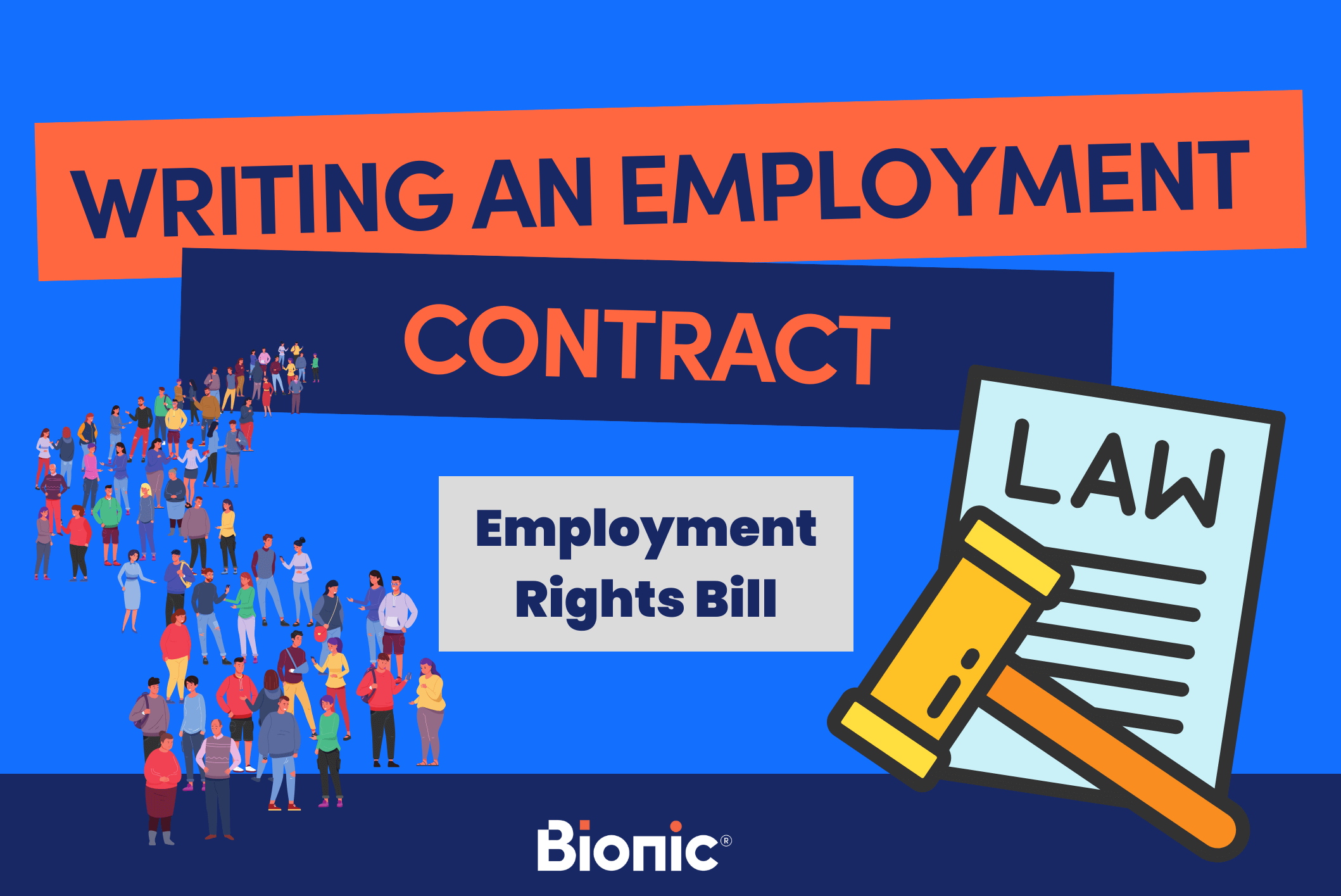How to write a UK employment contract for a small business in 2025/26
Writing your first employment contract doesn't have to be complicated, but you need to get it right. There are major changes coming to employment law over the next few years with the upcoming Employment Rights Bill - so getting your contracts written up correctly from the get-go will be key.
Taking on new staff is an exciting time for your business, but it also comes with boring admin. Every employee needs an employment contract with their employer from the moment they accept a job offer, so understanding what you need to include is vital.
This guide walks you through everything you need to include when it comes to employment contracts in 2025 and beyond. With the upcoming legislation in mind, lets dive in.

What is a contract of employment?
A contract of employment, or an employment agreement, is a mandatory document that allows businesses to hire employees. They’re used pretty much across every sector, allowing employers to set out expectations, including benefits, pay and more.
A contract exists as soon as a potential employee agrees to an offer of employment, regardless of whether the offer is a written document or a spoken agreement.
What legal requirements do I need to include in a UK employment contract right now?
Employment law has seen some changes over the years, so it’s a good idea to brush up on what you need to include in a contract, keeping recent and upcoming reforms in mind. Here's what you must include in 2025:
Principal statements
You need to include key employment details on or before your employee's first day. This principal statement must include:
- Employee's name and your business name
- Job title and start date
- Place of work and normal working hours
- Pay rate and when they'll be paid
- Holiday entitlement details
- Any probation period length and conditions
Additional statement details
You have up to two months to provide these extra details to HMRC.
- Pension arrangements or where to find information
- Notice periods for both sides
- Details of any collective agreements
- Training requirements and who pays
- Disciplinary and grievance procedures
- Any oversees work terms
How should I structure a contract?
A well-structured contract prevents confusion from your employee and protects your business. Consider breaking it up into sections, following this process.
1. Job information section
Start with the basics that identify you as the employer and them as the employee
- Full legal names (yours and theirs)
- Their job title and department
- Who they report to and the location of the work
- Start date and employment type (permanent, fixed-term, part-time)
2. Pay and benefits details
Be specific about salary and benefits to avoid any issues down the line, include:
- Annual salary or hourly rate
- Payment frequency (weekly, monthly)
- Any pay for overtime
- Bonus or commission structures
- Benefits like pension contributions
- Other benefits like healthcare, discounts or freebies
3. Working hours and flexibility
With flexible working soon becoming a day-one right, clearly outline:
- Normal working hours and days
- Break entitlements – how many a day and how long?
- Flexible working policy and how to request changes
- Remote working arrangements if applicable
- Any requirement to work additional hours
4. Leave entitlements
You should include details on all types of leave to avoid confusion:
- Annual holiday allowance (minimum 28 days including bank holidays)
- Notice required for taking leave
- Sick leave policy and pay arrangements
- Maternity, paternity, and other family leave rights
Understanding the Employment Rights Bill
The government have set out a new Employment Rights Bill which is currently making its way through the final stages of parliament.
The aim of this bill is to tighten up employment laws, giving workers more rights and to tackle low pay and poor working conditions and poor job security. The changes are set to roll out in stages over the coming years.
What changes are being made to employment laws?
The Employment Rights Bill has already brought in some changes and there’s more to come. Here’s a breakdown.
April 2026 changes
- Flexible working requests from day one - Employees are within their right to request flexible working from their first day and they can make two requests per year. Employers must respond to this within two months.
- One week of leave for care responsibilities – Employees have a right to take unpaid leave to care for an immediate family member – this is also a day one right.
- Increased protection for pregnant employees – Employees taking parental leave are now protected against redundancy for at least 18 months after a child is born, not just on maternity leave.
- More flexibility for paternity leave – Employees taking statutory paternity leave can now take their two weeks at separate times instead of one two-week block.
- Collective redundancy consultation – May mean multi-sites employers need to carry out multi-site consultation – where businesses must inform trade union on redundancies of more than 20 people.
- Enhanced whistleblowing protections – To give more protection to employees who come forward to suggest wrongdoing by their employer
October 2026
- Tougher ‘Fire and rehire’ practices – If you try to dismiss employees for failing to agree to changes, it will be a lot harder with tougher restrictions in place
Changes due in 2027
- Day one right to unfair dismissal – Employees will now be able to claim unfair dismissal as soon as they start working
- Reforms to zero-hours contracts – After a defined period (normally 12 weeks), employers will have to offer guaranteed hours based on those they have been working, including any agency workers you take on.
- Adjusted bereavement leave - Time off for bereavement for pregnancies for up to 24 weeks
What does this mean for my contracts?
When creating new contracts, you’ll need to include new policies as they are passed by law. It’s a good idea to start preparing what you’re going to include now by:
- Consider stricter hiring processes - Make sure the employee is right for your business as it may be harder to dismiss them once they start working, even after in a probationary period.
- Reviewing zero-hours arrangements – Can you afford to offer guaranteed hours to staff?
- Updating harassment prevention policies – Make sure you are taking ALL steps to prevent sexual harassment, by providing regular training
- Ensure your staff conduct work in a professional manner - You may be liable for third-party harassment, so keep this in mind.
- Think about building in flexibility into contract terms – How can you offer this even when you’re a small business?
How can I avoid costly contract mistakes?
Whether you run a takeaway, a shop or anything in between - learning from others' mistakes can save time, money, and potential legal problems. Here are some of most common pitfalls employers face with contracts.
Using generic templates
- Using outdated templates - Employment law changes frequently, so always check your templates are up to date. You can use an online template but always check through it to ensure it includes everything in-line with current employment law. Sites like LawDepot and Indeed have templates you can download.
- Using a one-size-fits-all approach - Different roles need different terms. For example, a car salesman contract will be completely different for someone working in an office admin role.
- Missing industry-specific clauses - Construction workers need different health and safety terms than office staff as the work they do is much more dangerous.
"Fluffy language” that isn’t clear
- Vague job descriptions - "Other duties as required" is not clear if you include that in a contract, it could lead to disputes. Always specify duties.
- Unclear working times - Not specifying whether overtime is expected or voluntary could lead to unhappy employees and issues down the line.
No following legal compliance
- Ignoring minimum wage rates – Minimum wage changes annually, so you need to update pay rates accordingly. As of April 2025, minimum wage is £12.21 per hour for over 21s, £10 per hour for those aged 18-20 and £7.55 for those under 18 and apprentices.
- Missing employee rights - Failing to include legal minimums for holidays, breaks, or family leave could lead to issues as employees are entitled to 28 days holiday. (including bank holidays), and at least a 20-minute break if they work for six hours or more.
- Outdated policies - New requirements like sexual harassment policies have to be communicated to employees.
Missing clauses
- No variation clauses – If you need to make a major business change – like moving premises, consider the impact this could have on your employees. You should clearly write in changes to your contract to help your business grow without issues.
- Rigid working arrangements - With flexible working becoming a day-one right, you should try to build in some flexibility. This can be hard when you have shift work, but making a rota to suit employees lives outside of work can go a long way in keeping them onside.
- Missing probation periods - With day-one unfair dismissal rights coming in 2026, probation periods become more important, and they may change. Outlining why someone could be dismissed in-line with law, is key as it’s looking like it’ll become harder to dismiss an employee unless they are not suitable for the role or breach their contract in some way.
Alex Mcloy – Legal Counsel at Bionic states – “Employees have lives outside of work and may request flexible working to drop their kids off at school and pick them up. In the upcoming Employment Rights Bill, as an employer, you have to consider their request. Outright refusing without any explanation or unfair reasons could cause you legal issues as employees will have more rights.”
Where can I find reliable templates?
There are plenty of (free) online templates to get you started – but keep in mind you should check these are up to date and amend them for your own business. For example, if you are a cafe then include uniform requirements including suitable shoes that are safe for work purposes, you should also outline if the employee needs to pay for these.
Free government templates
ACAS and LawDepot provide free employment contract templates that meet legal requirements. These could be suitable for shops, salons, takeaways and many more small businesses as well as those who need contractors.
What about different types of employment contracts?
If you’re looking to hire someone full time then the most common type of contract is for full-time permanent employment, but some businesses increasingly use flexible arrangements or zero-hour contracts. It’s a good idea to consider which type you want to offer.
Permanent contracts
These are standard open-ended contracts that continue until terminated by either party with proper notice. These are best for core team members who work full time and that you want to keep long-term.
Fixed-Term contracts
These are normally used for specific projects, seasonal work, or maternity cover. These are good options for construction projects or cover if someone is off sick for a period of time. Think about including:
- A clear end date or completion criteria
- The reason it’s a fixed term contract
- The same rights as permanent employees
- Fair treatment regarding benefits (depending on the length of the contract, consider offering some benefits, like free food)
Part-time and flexible contracts
These contracts are growing in popularity, especially with new flexible working rights for employees. These should include:
- Specific working days and hours
- Pro-rata holiday and benefit calculations
- Overtime arrangements
- Flexible working policies
Zero-hours contracts
These are contracts where hours are based on demand of work, and employees are not contracted to do any work if there isn’t any. However, major changes are coming to zero-hours contracts to stop employers exploiting them and to give workers more security.
These changes are set to come in 2027, with more details to be revealed. But expect:
- Predictable hours based on historical patterns
- Reasonable notice of shift changes
- Protection from cancelled shifts last minute
- Offers of guaranteed hours
Don't forget you’ll need insurance
If you employ any staff, you need employers' liability insurance by law.
This type of insurance can help protect against workplace injury claims. For example, if an employee burns themselves working in a kitchen or slips on a greasy floor and puts in a claim. Learn more about employee injuries at work.
Common questions about employment contracts
Do I need written contracts for all employees?
While employment contracts don't have to be legally written, it’s a good idea to write them up. You must provide all the information outlined above, including hours, pay and benefits - for example.
Do I need to send employee contracts to HMRC?
No, you don’t need to send employee contracts to HMRC, but you need to tell them who your employees are through Payroll. To do this, you must register as an employer and get an ERN number. An employer reference number that allows you to pay your employees.
Can I change employee contracts after signing?
This can be quite difficult once a contract is signed. Depending on what you need changing, you should consult with a legal professional*.
What happens if I make mistakes?
If you make an error once the contract is signed, you can try to correct it with written consent from your employee. But, if you wish to change pay or working conditions down the line, you may run into trouble with unions or tribunal claims – so it’s best to get legal advice on your individual matter.
How often should I update employment contracts?
Always review your employment contracts annually. And with the upcoming changes in employment law, It’s really important to check you’re updating your policies to reflect new changes.
How Bionic can support you
While writing in new changes into employment contracts can seem a headache, sorting out your business essentials doesn’t need to be. At Bionic, we can help support your business in other ways – from sorting out your next business energy contract to finding business insurance that fits the needs of your business.
Speak to our team or start a quote online to compare business insurance to find cover that fits your business.
Bionic does not provide legal advice. The information provided is for general informational purposes only and should not be relied upon as a substitute for professional legal counsel. If you are unsure about any aspect of your employment contract, please consult a qualified legal professional.








